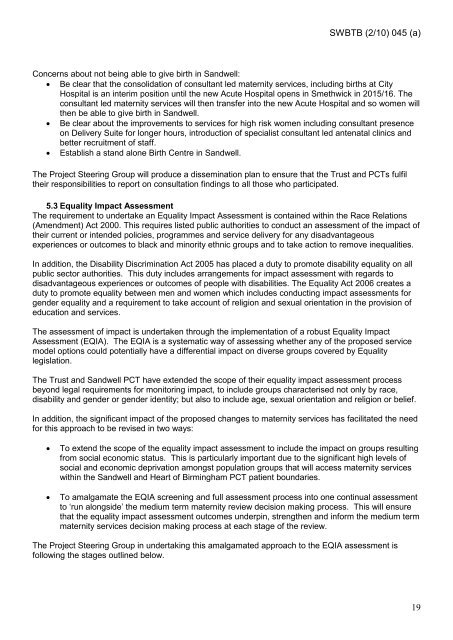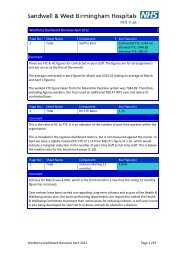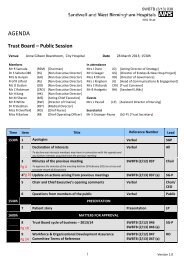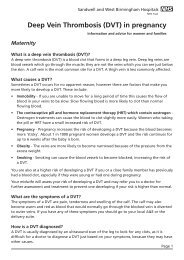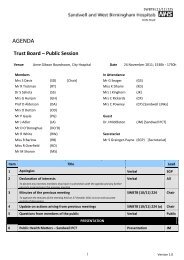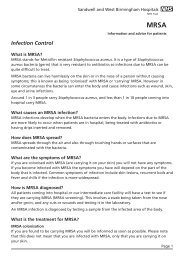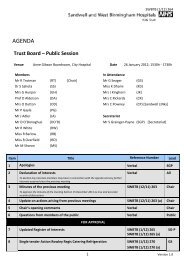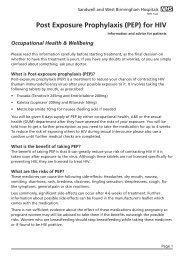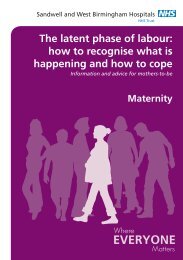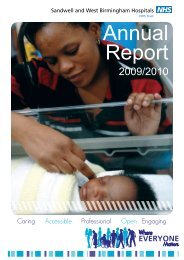Trust Board Febuary 2010 - Sandwell & West Birmingham Hospitals
Trust Board Febuary 2010 - Sandwell & West Birmingham Hospitals
Trust Board Febuary 2010 - Sandwell & West Birmingham Hospitals
You also want an ePaper? Increase the reach of your titles
YUMPU automatically turns print PDFs into web optimized ePapers that Google loves.
SWBTB (2/10) 045 (a)<br />
Concerns about not being able to give birth in <strong>Sandwell</strong>:<br />
• Be clear that the consolidation of consultant led maternity services, including births at City<br />
Hospital is an interim position until the new Acute Hospital opens in Smethwick in 2015/16. The<br />
consultant led maternity services will then transfer into the new Acute Hospital and so women will<br />
then be able to give birth in <strong>Sandwell</strong>.<br />
• Be clear about the improvements to services for high risk women including consultant presence<br />
on Delivery Suite for longer hours, introduction of specialist consultant led antenatal clinics and<br />
better recruitment of staff.<br />
• Establish a stand alone Birth Centre in <strong>Sandwell</strong>.<br />
The Project Steering Group will produce a dissemination plan to ensure that the <strong>Trust</strong> and PCTs fulfil<br />
their responsibilities to report on consultation findings to all those who participated.<br />
5.3 Equality Impact Assessment<br />
The requirement to undertake an Equality Impact Assessment is contained within the Race Relations<br />
(Amendment) Act 2000. This requires listed public authorities to conduct an assessment of the impact of<br />
their current or intended policies, programmes and service delivery for any disadvantageous<br />
experiences or outcomes to black and minority ethnic groups and to take action to remove inequalities.<br />
In addition, the Disability Discrimination Act 2005 has placed a duty to promote disability equality on all<br />
public sector authorities. This duty includes arrangements for impact assessment with regards to<br />
disadvantageous experiences or outcomes of people with disabilities. The Equality Act 2006 creates a<br />
duty to promote equality between men and women which includes conducting impact assessments for<br />
gender equality and a requirement to take account of religion and sexual orientation in the provision of<br />
education and services.<br />
The assessment of impact is undertaken through the implementation of a robust Equality Impact<br />
Assessment (EQIA). The EQIA is a systematic way of assessing whether any of the proposed service<br />
model options could potentially have a differential impact on diverse groups covered by Equality<br />
legislation.<br />
The <strong>Trust</strong> and <strong>Sandwell</strong> PCT have extended the scope of their equality impact assessment process<br />
beyond legal requirements for monitoring impact, to include groups characterised not only by race,<br />
disability and gender or gender identity; but also to include age, sexual orientation and religion or belief.<br />
In addition, the significant impact of the proposed changes to maternity services has facilitated the need<br />
for this approach to be revised in two ways:<br />
• To extend the scope of the equality impact assessment to include the impact on groups resulting<br />
from social economic status. This is particularly important due to the significant high levels of<br />
social and economic deprivation amongst population groups that will access maternity services<br />
within the <strong>Sandwell</strong> and Heart of <strong>Birmingham</strong> PCT patient boundaries.<br />
• To amalgamate the EQIA screening and full assessment process into one continual assessment<br />
to ‘run alongside’ the medium term maternity review decision making process. This will ensure<br />
that the equality impact assessment outcomes underpin, strengthen and inform the medium term<br />
maternity services decision making process at each stage of the review.<br />
The Project Steering Group in undertaking this amalgamated approach to the EQIA assessment is<br />
following the stages outlined below.<br />
19


